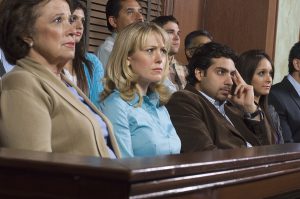Winning A Civil Suit Means Educating Your Jury
 Michael Babboni
Personal Injury
One of the things that most people accept as a normal part of the American judicial process is the jury. We see juries all the time in reality television, news broadcasts and the films, television and other fiction that covers legal drama. But we often overlook the jury in favor of the spectacular speeches by lawyers, or the nervous collapse of a witness at the stand.
Michael Babboni
Personal Injury
One of the things that most people accept as a normal part of the American judicial process is the jury. We see juries all the time in reality television, news broadcasts and the films, television and other fiction that covers legal drama. But we often overlook the jury in favor of the spectacular speeches by lawyers, or the nervous collapse of a witness at the stand.However, it is the jury that is the basis of American justice. The idea is that no single authority should decide the fate of a person being charged with a crime or sued in a court of law. Instead, every person is entitled to have that decision of punishment or no punishment be decided by people just like him or her, and that’s the jury.
And this is why one of the greatest unsung skills in the trial process is the ability to educate a jury.
Unbiased & Unqualified
The central premise of a jury is that they are selected to make a verdict after hearing the merits of both sides of an accusation as presented by lawyers. Part of this process requires that the jury be unbiased, meaning that they are carefully selected to not have any knowledge, prejudices or attitudes that would predispose them to make a decision one way or the other.
However, this very lack of bias also often means that the members of a jury have no legal or technical knowledge when it comes to going over the evidence and arguments presented in a case. This means that it is up to the lawyer to present the necessary information in such a way that the jury has the best possible chance of understanding what is stake, and are able to make their decision.
People Skills Count
Like a teacher, a good personal injury lawyer can reach out to a group of people and find the right way to communicate to them and reach them. This is often a combination of many different techniques, such as using diagrams and other trial exhibits, bringing in expert witnesses, and, quite often, simply being able to find the right words to explain to a jury exactly what is going on.
After all, a medical expert may get extremely technical about the nuances of a traumatic brain injury, and it would be no surprise that much of the technical jargon would be lost on the average person. But a good lawyer can take that wealth of medical, technical detail and summarize it in a way that explains to the jury exactly how a person will be affected, and how this will impact his or her life. A jury cannot make a good decision if they don’t have all the facts and information clearly laid out for them. That’s where the role of a lawyer in a trial can be critical.
Experience Counts
If you’re in a personal injury lawsuit and it is actually going to trial, make sure that you’ve got a St. Pete lawyer that has knowledge and know how to handle a trial. Many lawyers will try to avoid an actual trial and go for a settlement, but if a trial is going to occur, make sure your legal advocate can actually handle not just the court experience, but the jury that comes with it.
